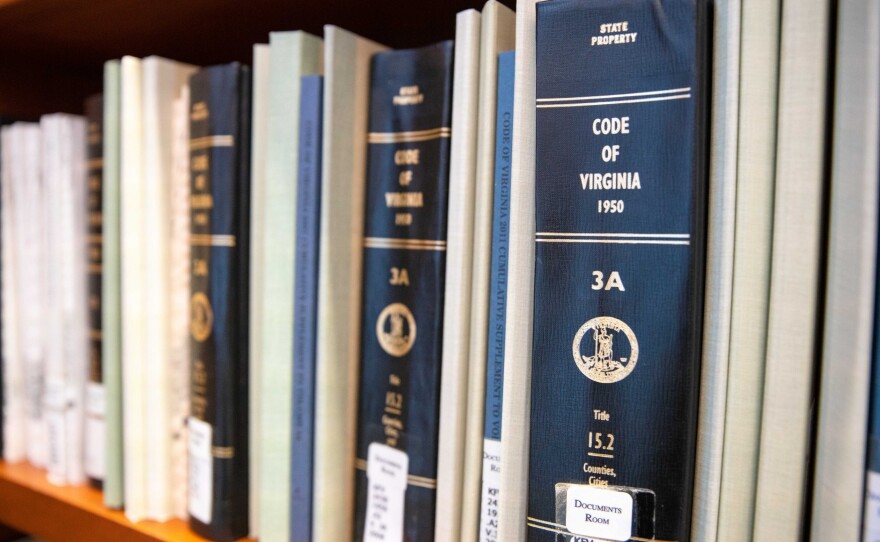Many people are questioning how the term "hate crime" is defined in the law, following deadly shootings in Atlanta last week. Eight people were killed, including six women of Asian descent. The Atlanta Police Department has not yet determined the incident to be racially motivated.
The Virginia Asian Advisory Board held a regularly scheduled meeting on Thursday, where members called on state leaders for help and raised questions about the commonwealth’s own hate crimes laws.
Chair May Nivar was realistic about the growing problem facing Asian Americans and Pacific Islanders - hate crimes against AAPI people rose sharply in major American cities last year, according to data from the Center for the Study of Hate & Extremism.
“What happened in Atlanta [Tuesday] could easily have happened here in Virginia,” said Nivar.
ACLU of Virginia's Jenny Glass spoke about Tuesday’s events, drawing attention to the increase in incidents of anti-AAPI hate.
“Nonetheless, no effective and coordinated response has been forthcoming from Virginia leaders,” Glass said.
Vice Chair Suja Amir says she sees so much of the same hatred she’s felt directed at her and her community as a Muslim woman in the United States now being directed at other Asian Americans and Pacific Islanders.
She says the stories of violence blend together - those from the pandemic and those from centuries of U.S. history, among all marginalized groups.
“It’s not one face and one name, it’s all of us,” Amir said.
Defining hate crimes
There were nearly 3,800 reported incidents of anti-AAPI hate nationwide over the last year, according to a recent report by nonprofit incident tracker Stop AAPI Hate. These include both verbal and physical abuse.
However, the report adds a caveat for “reported incidents” -- they are likely only a fraction of those actually occurring. Virginia, like other states, leaves much of what constitutes a hate crime to be determined by the criminal justice system.
The commonwealth defines hate crimes as acts intended to instill fear or restrict constitutional or state rights based on race, sexual orientation, gender identity, disability, religion or ethnic origin.
However, according to Crime in Virginia 2019, the state’s master report of crime statistics for that year, determining the “offender’s subjective motivation” in possible or suspected hate crimes is difficult.
“Bias is reported only if the investigation reveals sufficient information to lead a reasonable and prudent person to conclude that the offender’s actions were motivated, in whole or in part, by bias,” the report says.
Board member Justin Lo says that makes it difficult to prove that a crime is, in fact, hateful. He pressed Attorney General Mark Herring, who attended for a discussion on anti-AAPI hate and hate crimes, on the difficulties with definitions.
Herring says he’s aware of the problem from discussions with prosecutors and attorneys: “That is one of the biggest hurdles that they face, is proving [motivation] to the criminal standard, beyond a reasonable doubt.”
Some prosecutors choose not to pursue hate crime charges fearing they’ll undermine prosecution for more basic charges, such as assault. Herring admits that undermines public confidence.
“I mentioned an incident in my home county where racial epithets were spray painted on a historic African American schoolhouse,” Herring said. “That ended up not being charged as a hate crime.”
The AG followed that he sees education programs, as the best way to make hate crime charges viable. He argues such programs will eventually impact jury pools and the decisions they make.
Nivar pointed to work being done in state government on early childhood education and anti-racism. She told VPM News in an interview after the meeting that she feels a sense of urgency around the threat of violence and discrimination. She wants to see it addressed now.
“These are efforts that have been long discussed and long requested by many communities, particularly of course the Black community,” she said. “And here we are. We’re finding ourselves asking for acceleration, expediency.”
Calling for action
Gov. Ralph Northam addressed the board and offered his condolences. He acknowledged there’s a clear trend of anti-AAPI hate in data but said, “we also don’t need stats to see what’s in front of our faces.”
The board has been around for nearly 20 years, members of which were appointed by Northam, and has no policy-making power. But they are expected to, as the name implies, advise the administration on issues facing AAPI communities. So, Nivar and Amir took time to make requests while the governor was present.
Nivar asked for public dialogue with state officials and AAPI communities on hate crimes and anti-Asian sentiment, following the events in Atlanta and a string of burglaries at Asian-owned businesses in Northern Virginia.
“People want to be heard,” she said. “Will you hold a town hall for us?”
Northam agreed that organizing listening tours would be helpful and said the state would make it happen.
“Our community wants to see you, wants to see the leadership,” Nivar said.
VAAB is early in the process of making their yearly report to the governor, which is one of the board’s main responsibilities. The report is a summary of challenges facing the AAPI community and recommendations to the Northam administration and state legislators.
Stop AAPI Hate has a short list of safety tips for people experiencing hate and those witnessing abuse.
And the attorney general’s website now features a page of resources for Asian Americans and Pacific Islanders facing hate.
Correction: A previous version of this story stated that the Virginia Asian Advisory Board was created by Gov. Northam, when it was not. The board has been around for about 20 years. The story has since been updated.



